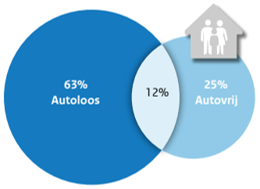Living without a car
Student information
Author: Pieter De Smet
Institution: University of Antwerp
Graduation year: 2022
Living without a car: an analysis of the car-sharing landscape in Belgium
This research is in two parts. The first part focuses on understanding the group of households without a car and the advantages and disadvantages they experience as a result of not owning a car.
In the context of this study, a zero-car household was viewed as not owning a car. However, zero-car households may still use a car. To understand the issues concerning not owning a car, a literature review was conducted. This revealed that the group of zero-car households is diverse. The group can be subdivided based on the underlying reasons for not owning a car:
car-free households who do not own a car by choice.
car-less households who do not own a car due to external factors.
In this context, the label was applied according to the disadvantages experienced by the car-free and car-less households. Reasons for a household being car-less are mainly economic, however, depending on the residential location a household may be forced into car ownership to participate in economic, political, and social life of the community.
Car-free households are mainly located in more densely populated areas with better public transport coverage than car-less households. These car-less households therefore tend to experience more mobility disadvantages than car-free households.
The second part of this research focuses on the car-sharing landscape in Belgium as a possible solution for car-free and car-less households. This involved comparing the various organisations regarding general operation, geographical locations, additional facilities, and cost price.
The car-sharing industry is competitive and still developing, while the lack of standardisation makes comparison difficult. The car-sharing providers distinguish themselves mainly by the region in which they operate, the facilities offered and the conditions for users. Car-sharing organisations which specifically target sparsely populated areas may offer a solution for the group of car-less households.
Figure 4 Car-free versus car-less households

